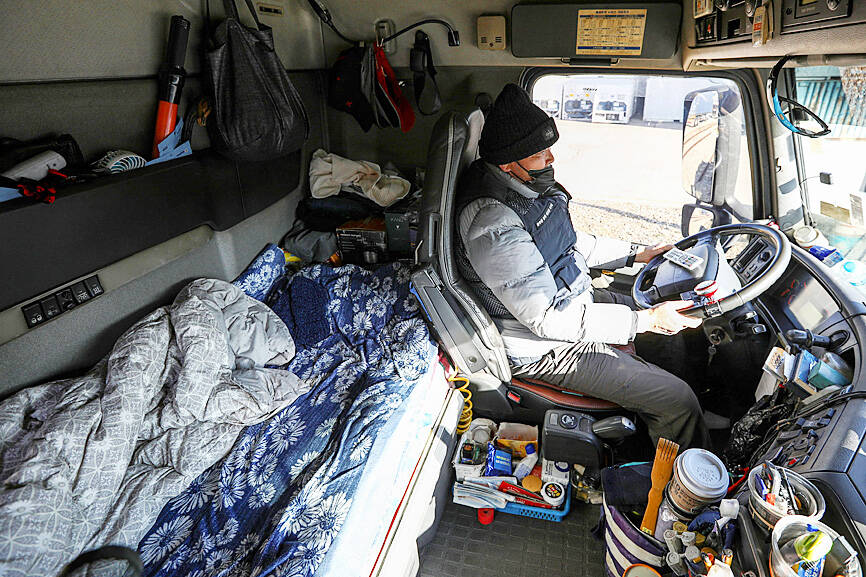A major umbrella union has joined a protest by South Korean truckers, broadening a work stoppage that is disrupting global supply chains and hitting local exporters.
The Korean Confederation of Trade Unions is today staging demonstrations at 16 places to support striking truck drivers, it said on its Web site.
The union, which has about 1 million members, including metal workers in autos, shipbuilding and chip industries, did not disclose how many participants would be at the protests.

Photo: Reuters
BETTER COMPENSATION
Calling for better wage systems since Nov. 24, the truckers’ strike is straining supply chains at South Korean exporters as they are blocking ports and entrances of plants.
The government has issued orders in an attempt to force drivers in key industries to return to work, but just 25 percent of container shipments recovered to the normal levels as of 5pm on Sunday, the South Korean Ministry of Oceans and Fisheries said.
From yesterday, the South Korean Ministry of Trade, Industry and Energy started asking shippers and cargo owners whether their truck drivers are following the government’s orders, the ministry said in a statement on Sunday night.
The truckers’ union said it would continue the protests, blaming the government for “violently cracking down on strikes.”
South Korean President Yoon Suk-yeol’s approval rating rose for the second week amid his hard-line stance on the strike, a survey from Realmeter showed.
Yoon compared the truckers’ strike to “a threat like North Korea’s nuclear activities,” Yonhap News Agency reported, citing a recent meeting between the president and top officials.

Intel Corp chief executive officer Lip-Bu Tan (陳立武) is expected to meet with Taiwanese suppliers next month in conjunction with the opening of the Computex Taipei trade show, supply chain sources said on Monday. The visit, the first for Tan to Taiwan since assuming his new post last month, would be aimed at enhancing Intel’s ties with suppliers in Taiwan as he attempts to help turn around the struggling US chipmaker, the sources said. Tan is to hold a banquet to celebrate Intel’s 40-year presence in Taiwan before Computex opens on May 20 and invite dozens of Taiwanese suppliers to exchange views

Application-specific integrated circuit designer Faraday Technology Corp (智原) yesterday said that although revenue this quarter would decline 30 percent from last quarter, it retained its full-year forecast of revenue growth of 100 percent. The company attributed the quarterly drop to a slowdown in customers’ production of chips using Faraday’s advanced packaging technology. The company is still confident about its revenue growth this year, given its strong “design-win” — or the projects it won to help customers design their chips, Faraday president Steve Wang (王國雍) told an online earnings conference. “The design-win this year is better than we expected. We believe we will win

Chizuko Kimura has become the first female sushi chef in the world to win a Michelin star, fulfilling a promise she made to her dying husband to continue his legacy. The 54-year-old Japanese chef regained the Michelin star her late husband, Shunei Kimura, won three years ago for their Sushi Shunei restaurant in Paris. For Shunei Kimura, the star was a dream come true. However, the joy was short-lived. He died from cancer just three months later in June 2022. He was 65. The following year, the restaurant in the heart of Montmartre lost its star rating. Chizuko Kimura insisted that the new star is still down

While China’s leaders use their economic and political might to fight US President Donald Trump’s trade war “to the end,” its army of social media soldiers are embarking on a more humorous campaign online. Trump’s tariff blitz has seen Washington and Beijing impose eye-watering duties on imports from the other, fanning a standoff between the economic superpowers that has sparked global recession fears and sent markets into a tailspin. Trump says his policy is a response to years of being “ripped off” by other countries and aims to bring manufacturing to the US, forcing companies to employ US workers. However, China’s online warriors